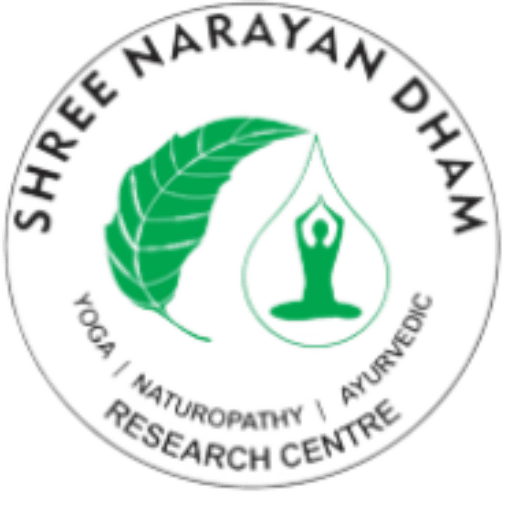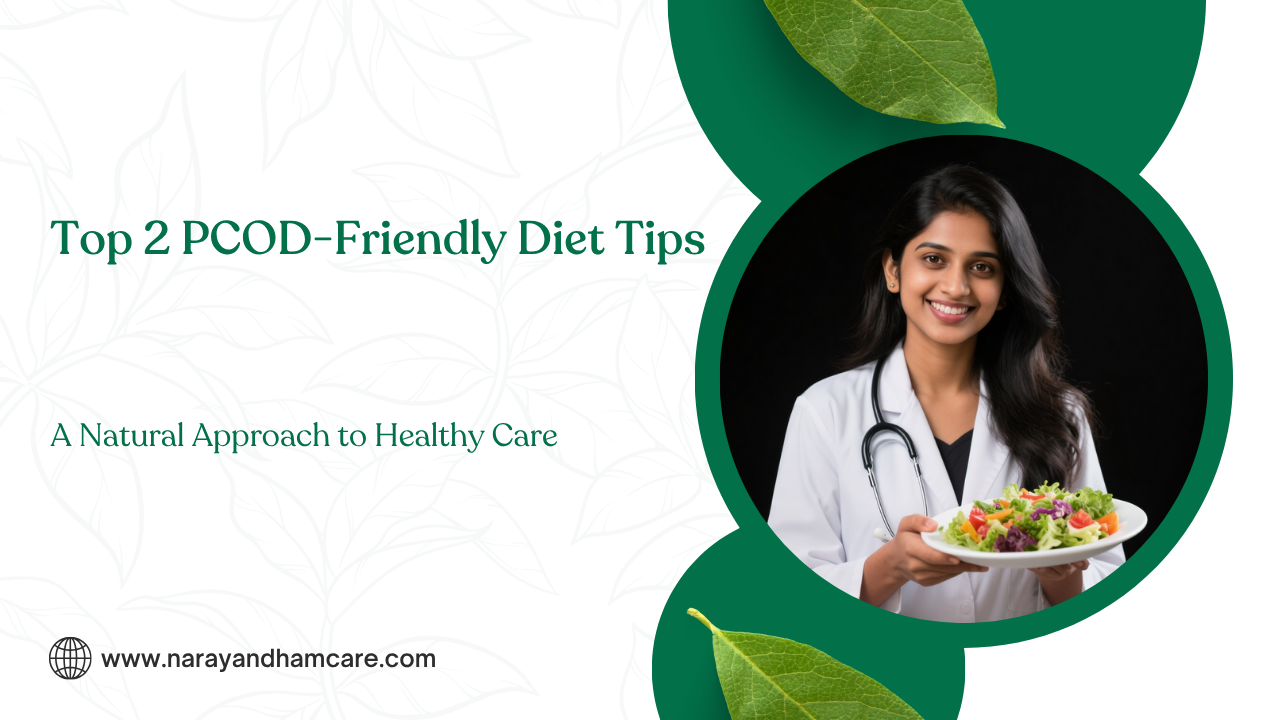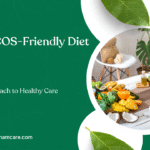🔹 PCOD: Introduction
Polycystic Ovarian Disease is a common health issue in many women today. It happens when the ovaries create more male hormones (androgens) than needed. This affects your periods, weight, mood, skin, hair, and even fertility.
Your diet plays a big role in balancing hormones naturally. The good news is — the right food can help manage symptoms and even support your long-term healing.
In this blog, we’ll share 3 simple and powerful diet tips that are friendly for women. These tips will help you maintain hormonal balance, reduce unwanted symptoms, and support overall health.
Whether you are newly diagnosed or have been dealing for years, this guide will be easy to follow. Let’s begin!
🔹 Problem
Many women today suffer due to unhealthy lifestyle habits, stress, processed food, and lack of exercise. The main issue is a hormonal imbalance, where insulin and androgen levels go out of control.
This problem mostly affects women between the ages of 15 to 40. Many don’t even know they have until they face period irregularities, skin breakouts, or difficulty in getting pregnant.
If not managed properly, PCOD can lead to:
- Weight gain
- Acne and oily skin
- Excess facial or body hair (hirsutism)
- Hair thinning or hair loss
- Mood swings
- Irregular or painful periods
- Fertility issues
Why does this happen?
Because the foods we eat directly affect hormones like insulin and estrogen. Processed, sugary, and junk food can worsen PCOD. But eating clean, whole foods can bring balance.
🔹 Symptoms of PCOD
Here are common signs and symptoms of PCOD that you should not ignore:
- Irregular or missed periods
- Heavy bleeding during periods
- Unwanted facial or body hair (especially on chin, chest, back)
- Severe acne or oily skin
- Weight gain, especially around belly
- Difficulty in losing weight
- Mood changes, depression, or anxiety
- Hair thinning or hair fall
- Difficulty in conceiving (infertility)
- Dark patches of skin (neck, underarms)
These symptoms may vary from person to person. Some women may only have mild signs, while others may struggle daily. A balanced diet can help reduce many of these symptoms.
🔹 Solution: Top 2 PCOD-Friendly Diet Tips for Hormonal Balance
Let’s now discuss 2 practical diet tips that can naturally balance your hormones and help manage PCOD symptoms.
Tip 1: Switch to a Low Glycemic Index (GI) Diet
What is Glycemic Index (GI)?
GI measures how fast a food increases your blood sugar. High-GI foods cause blood sugar spikes, which increase insulin — a hormone that worsens.
High insulin leads to:
- More androgen production (male hormones)
- Irregular periods
- Weight gain and sugar cravings
Low-GI foods digest slowly, keeping your sugar and insulin stable.
Best Low-GI Foods for PCOD:
- Whole grains (quinoa, barley, oats, brown rice)
- Green leafy vegetables (spinach, kale, fenugreek)
- Legumes (chickpeas, moong, kidney beans)
- Nuts and seeds (almonds, chia seeds, flaxseeds)
- Fruits like apples, pears, oranges, guava, and berries
- Sweet potato (instead of white potato)
Avoid These High-GI Foods:
- White bread, pasta, white rice
- Cakes, pastries, donuts
- Sugary drinks and sodas
- Packaged cereals
- Processed snacks like chips and biscuits
Tip: Always combine carbs with fiber or protein. For example, pair roti with dal and sabzi instead of just plain rice.
Tip 2: Include Healthy Fats and Protein in Every Meal
Most people think fat is bad, but healthy fats and plant-based proteins are important for hormone production and repair.
PCOD leads to inflammation in the body. Omega-3 fatty acids and proteins can reduce this inflammation and support better hormone balance.
Healthy Fats to Eat:
- Coconut oil (cold-pressed)
- Avocado
- Flaxseeds and chia seeds
- Nuts (almonds, walnuts)
- Ghee (in small amounts)
- Olive oil
Best Protein Sources for PCOD:
- Moong dal, masoor dal, chana
- Quinoa, amaranth
- Sprouts and tofu
- Paneer (in moderation)
- Seeds: Pumpkin, sunflower, flaxseeds
Tip: Add protein to every meal. For example, start your day with moong chilla or besan cheela with vegetables. For lunch, add dal and curd to your plate.
🔹 Frequently Asked Questions (FAQ)
Q1: Can diet alone cure PCOD?
A: Diet is not a cure, but it plays a key role in managing naturally. A healthy diet combined with exercise and stress management can help reverse symptoms over time.
Q2: What should I avoid eating with PCOD?
A: Avoid sugar, junk food, refined carbs (white bread, pasta), deep-fried foods, and processed snacks. These increase inflammation and hormone imbalance.
Q3: How much water should I drink daily?
A: Aim for at least 2.5 to 3 liters of water daily. Staying hydrated helps flush toxins and support better digestion and hormone health.
Q4: Is dairy safe for PCOD?
A: Some women are sensitive to dairy. Try reducing milk, curd, and paneer for a few weeks and see how your body responds.
Q5: Can I eat fruits if I have PCOD?
A: Yes! Choose low-sugar fruits like berries, apples, guava, and papaya. Avoid fruit juices and too much mango or banana.
🔹 Conclusion
it can feel overwhelming, but the right diet can bring balance, peace, and healing. Remember — small changes done consistently can create big results.
Start by:
- Eating more whole grains, fresh veggies, and healthy fats
- Avoiding sugar and processed food
- Adding protein to every meal
- Drinking enough water and sleeping well
Your body wants to heal — you just have to give it the right support.
Take action today. Start with just one diet tip and slowly build your healthy habits. PCOD can be managed naturally and effectively with love, patience, and the right foods.
Do you have any questions or PCOD-friendly meal ideas to share? Comment below — we’d love to hear from you!





